The Fall of Jerusalem
Comments for Study 38
Pick to read this Bible passage in a separate window.
SORRY, THE COMMENTARY FOR THIS STUDY IS NOT FINISHED.
CLICK HERE FOR A LIST OF BOOKS THAT ARE COMPLETED.
I. King Zedekiah Captured (52:1-11)
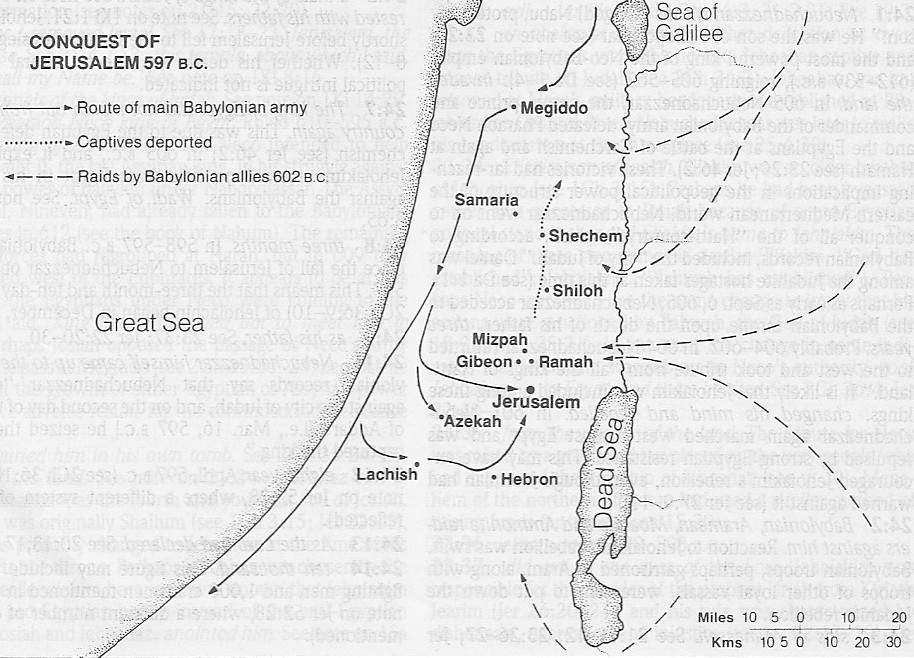
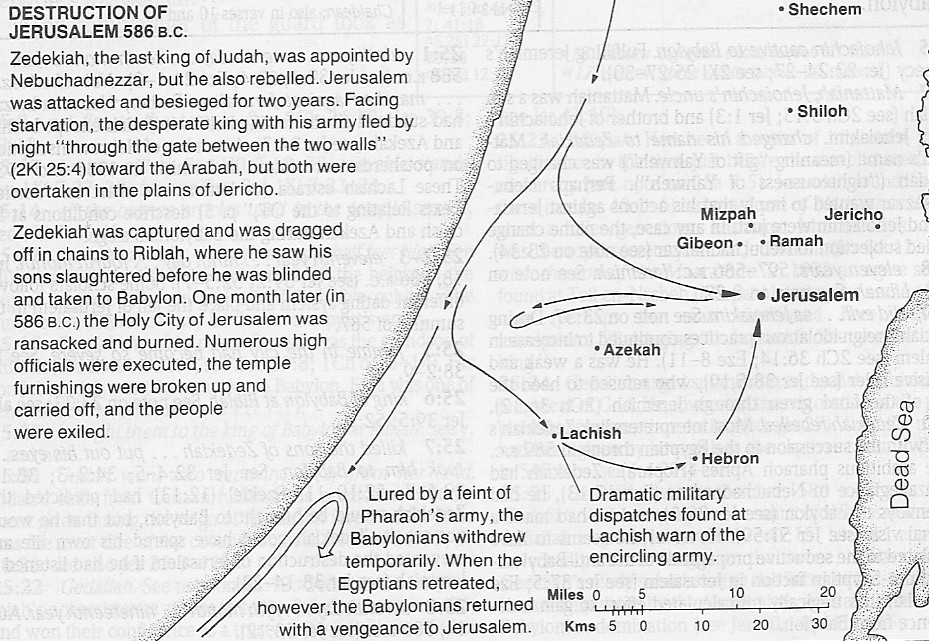
>1. Who was the last king of Israel? (1-2)
* Jeremiah 52:1-2 "Zedekiah was twenty-one years old when he became king, and he reigned in Jerusalem eleven years. His mother's name was Hamutal daughter of Jeremiah; she was from Libnah. He did evil in the eyes of the LORD, just as Jehoiakim had done."
* Verses 1-27; 31-34 parallels almost verbatim 2 Kings 24:18-25:21, 27-30. Verses 4-27 is summarized in 39:1-10.
* "Zedekiah" -Zedekiah reigned from 597-586 B.C. Nebuchadnezzar had made him king. He was the last king of Judah. Zedekiah was twenty-one years old when he became king, a puppet king of Babylon. (2 Kings 24:18-19) King Zedekiah took an oath of allegiance to the Babylonian king but soon became disloyal and entered into an alliance with Pharaoh Hophra, king of Egypt. So Nebuchadnezzar besieged the city from 10 January 587 to 9 July 586 B.C. Jerusalem fell and approximately eighty distinguished leaders of the community were executed, the royal palace and the city were set on fire, and the survivors (except the poorest of the land) were taken into captivity. After him governors ruled Israel/Judah on Babylon's behalf.
* 2 Kings 24:18-20 "Zedekiah was twenty-one years old when he became king, and he reigned in Jerusalem eleven years. His mother's name was Hamutal daughter of Jeremiah; she was from Libnah. He did evil in the eyes of the LORD, just as Jehoiakim had done. It was because of the LORD's anger that all this happened to Jerusalem and Judah, and in the end he thrust them from his presence. Now Zedekiah rebelled against the king of Babylon."
* 2 Chronicles 36:11-14 "Zedekiah was twenty-one years old when he became king, and he reigned in Jerusalem eleven years. He did evil in the eyes of the LORD his God and did not humble himself before Jeremiah the prophet, who spoke the word of the LORD. He also rebelled against King Nebuchadnezzar, who had made him take an oath in God's name. He became stiff-necked and hardened his heart and would not turn to the LORD, the God of Israel. Furthermore, all the leaders of the priests and the people became more and more unfaithful, following all the detestable practices of the nations and defiling the temple of the LORD, which he had consecrated in Jerusalem."
* "Hamutal daughter of Jeremiah" -Not the prophet Jeremiah. Jeremiah did not marry according to the Lord's word to him.
* "Libnah"
* "He did evil in the eyes of the LORD" -The Lord God sees sin as evil. Sin is the result of a heart that does long love the Lord God.
* "Jehoiakim" -Jehoiakim (609-597 B.C.) was ambitious, cruel and corrupt. (2 Kings 23:36-37; 2 Chronicles 36:2-8) Egypt's Pharaoh Neco made Eliakim son of Josiah king in place of his father Josiah and changed Eliakim's name to Jehoiakim. Jehoiakim paid Pharaoh Neco the silver and gold he demanded. In order to do so, he taxed the land and exacted the silver and gold from the people of the land according to their assessments. (2 Kings 23:33-34) In the third and fourth years of his reign Babylon defeated Egypt and besieged Jerusalem.
* 2 Chronicles 36:5-8 "Jehoiakim was twenty-five years old when he became king, and he reigned in Jerusalem eleven years. He did evil in the eyes of the LORD his God. Nebuchadnezzar king of Babylon attacked him and bound him with bronze shackles to take him to Babylon. Nebuchadnezzar also took to Babylon articles from the temple of the LORD and put them in his temple there. The other events of Jehoiakim's reign, the detestable things he did and all that was found against him, are written in the book of the kings of Israel and Judah. And Jehoiachin his son succeeded him as king."
>Why did Jerusalem and Judah fall? (3)
* Jeremiah 52:3 "It was because of the LORD's anger that all this happened to Jerusalem and Judah, and in the end he thrust them from his presence. Now Zedekiah rebelled against the king of Babylon."
* "the LORD's anger"
* "all this happened to Jerusalem and Judah"
* "in the end he thrust them from his presence" -As Adam and Eve were thrust from his presence when they sinned.
* "Zedekiah rebelled against" -He stopped paying tribute and asked
* "the king of Babylon" -Nebuchadnezzar (634 - 562 B.C.) was king of the Neo-Babylonian Empire, who reigned from 605 - 562 B.C. The Akkadian name means "O god Nabu, preserve/defend my firstborn son". Nabu is the Babylonian deity of wisdom, and son of the god Marduk. In an inscription, Nebuchadnezzar styles himself as Nabu's "beloved" and "favourite". Nebuchadnezzar was the oldest son and successor of Nabopolassar, who delivered Babylon from its three centuries of vassalage to its fellow Mesopotamian state Assyria, and in alliance with the Medes, Persians, Scythians and Cimmerians, laid Nineveh in ruins. During the last century of Nineveh's existence, Babylon had been greatly devastated, not only at the hands of Sennacherib and Assurbanipal, but also as a result of her ever renewed rebellions. Nebuchadnezzar, continuing his father's work of reconstruction, aimed at making his capital one of the world's wonders.
>When did this happen? (4-5)
* Jeremiah 52:4-5 "So in the ninth year of Zedekiah's reign, on the tenth day of the tenth month, Nebuchadnezzar king of Babylon marched against Jerusalem with his whole army. They camped outside the city and built siege works all around it. The city was kept under siege until the eleventh year of King Zedekiah."
* "in the ninth year" -Some say 589, 588 or 587 B.C. See below for more.
* "on the tenth day" - The final siege of Jerusalem started on the tenth day of the Hebrew calendar. (2 Kings 25:1; Ezekiel 24:1-2). (Some say the Hebrew 10th day that month and year would be January 15 on the Gregorian calendar.)
* "of the tenth month" -This is the Hebrew month. According to the modern Gregorian calendar December/January.
* "marched against Jerusalem with his whole army" -Nebuchadnezzar was determined to destroy the city. He had come to what he saw as a rebellious territory before. This time he would make sure they wouldn't revolt against him again. So he was determined to take away all their authority and leave just enough people to harvest and plant crops.
* "They camped outside the city and built siege works all around it."-Babylon was very good at creating siege works. They used this method many times against their enemies there were walled up in their cities.
* "the eleventh year of King Zedekiah" -586 B.C.
* Babylon and Judah counted king's reigns differently. According to the Babylonian system of computing the years of a king's reign, the third year of Jehoiakim would have been 605 B.C. (Daniel 1:1), since his first full year of kingship begun on New Year's Day after his ascension in 608 B.C. But according to the Judahite system, which counted the year of ascension as the first year of reign, this was the fourth year of Jehoiakim (Jeremiah 25:1, 46:2) Also note that the Babylon and Hebrew calendars had different months and began the year at different times. Add to this mess of dates is the fact that that the modern calendar (Gregorian) is not the same as the Babylonian or the Hebrew calendar.
* The Babylonian Chronicles, which were published by Donald Wiseman in 1956, establish that Nebuchadnezzar captured Jerusalem the first time on 2 Adar (16 March) 597 B.C. Before Wiseman's publication, Thiele had determined from the biblical texts that Nebuchadnezzar's initial capture of Jerusalem occurred in the spring of 597 B.C, while other scholars, including Albright, more frequently dated the event to 598 B.C.
* There has been some debate as to when the second siege of Jerusalem took place. Though there is no dispute that Jerusalem fell the second time in the summer month of Tammuz, William F. Albright dates the end of Zedekiah's reign (and the fall of Jerusalem) to 587 B.C., whereas Edwin R. Thiele offers 586 B.C.
Thiele's reckoning is based on the presentation of Zedekiah's reign on an accession basis, which was used for most but not all of the kings of Judah. In that case, the year that Zedekiah came to the throne would be his zeroth year; his first full year would be 597/596 B.C., and his eleventh year, the year Jerusalem fell, would be 587/586 B.C. Since Judah's regal years were counted from Tishri in autumn, this would place the end of his reign and the capture of Jerusalem in the summer of 586 B.C.
However, the Babylonian Chronicles support the enumeration of Zedekiah's reign on a non-accession basis. Zedekiah's first year when he was installed by Nebuchadnezzar was therefore in 598/597 B.C. according to Judah's Tishri-based calendar. The fall of Jerusalem in his eleventh year would then have been in the summer of 587 B.C. The Babylonian Chronicles allow the fairly precise dating of the capture of Jehoiachin and the start of Zedekiah's reign, and also provide the accession year of Nebuchadnezzar's successor Amel-Marduk (Evil Merodach) as 562/561 B.C., which was the 37th year of Jehoiachin's captivity according to 2 Kings 25:27. These Babylonian records related to Jehoiachin's reign are consistent with the fall of the city in 587 B.C. (wikipedia.org)
>2. How was the word of God spoken through Jeremiah fulfilled? (6)
* Jeremiah 52:6 "By the ninth day of the fourth month the famine in the city had become so severe that there was no food for the people to eat."
* "the ninth day of the fourth month" -July 18, 586 B.C. according to the modern Gregorian calendar. The siege lasted just over two and a half years.
* "the famine in the city had become so severe that there was no food for the people to eat"
* Jeremiah 11:22 "therefore this is what the LORD Almighty says: 'I will punish them. Their young men will die by the sword, their sons and daughters by famine."
* Jeremiah 16:4 "They will die of deadly diseases. They will not be mourned or buried but will be like refuse lying on the ground. They will perish by sword and famine, and their dead bodies will become food for the birds of the air and the beasts of the earth."
* Jeremiah 21:9 "Whoever stays in this city will die by the sword, famine or plague. But whoever goes out and surrenders to the Babylonians who are besieging you will live; he will escape with his life."
* Also see 27:9, 13, 38:2, 42:17, 22, and 44:12.
*
>What did Judah's army do? (7-8)
* Jeremiah 52:7-8 "Then the city wall was broken through, and the whole army fled. They left the city at night through the gate between the two walls near the king's garden, though the Babylonians were surrounding the city. They fled toward the Arabah, but the Babylonian army pursued King Zedekiah and overtook him in the plains of Jericho. All his soldiers were separated from him and scattered,"
* "the city wall was broken through" -Jerusalem walls were well built.
* "the whole army fled" -Later after Babylon left these men would return to Judah and continue to sin against the Lord.
*
*
*
*
>3. What did Zedekiah do and how were Jeremiah's words about him fulfilled? (9-11, 32:4-5, 34:2-3, 38:18; Ezekiel 12:13)
* Jeremiah 52:9-11 "and he was captured. He was taken to the king of Babylon at Riblah in the land of Hamath, where he pronounced sentence on him. There at Riblah the king of Babylon slaughtered the sons of Zedekiah before his eyes; he also killed all the officials of Judah. Then he put out Zedekiah's eyes, bound him with bronze shackles and took him to Babylon, where he put him in prison till the day of his death."
* Ezekiel 12:13 "I will spread my net for him, and he will be caught in my snare; I will bring him to Babylonia, the land of the Chaldeans, but he will not see it, and there he will die."
* See 39:5-7 and 2 Kings 25:4-7 for parallel passages.
* 2 Chronicles 36:15-21 "The LORD, the God of their fathers, sent word to them through his messengers again and again, because he had pity on his people and on his dwelling place. But they mocked God's messengers, despised his words and scoffed at his prophets until the wrath of the LORD was aroused against his people and there was no remedy. He brought up against them the king of the Babylonians, who killed their young men with the sword in the sanctuary, and spared neither young man nor young woman, old man or aged. God handed all of them over to Nebuchadnezzar. He carried to Babylon all the articles from the temple of God, both large and small, and the treasures of the LORD's temple and the treasures of the king and his officials. They set fire to God's temple and broke down the wall of Jerusalem; they burned all the palaces and destroyed everything of value there. He carried into exile to Babylon the remnant, who escaped from the sword, and they became servants to him and his sons until the kingdom of Persia came to power. The land enjoyed its sabbath rests; all the time of its desolation it rested, until the seventy years were completed in fulfillment of the word of the LORD spoken by Jeremiah."
* Jeremiah 32:4-5, 34:2-3, and 38:18 are warnings to Zedekiah. Ezekiel 12:13 predicts that Zedekiah would be brought to Babylon, but that he would not see it. Zedekiah could have spared his own life and prevented the destruction of Jerusalem if he had listened to Jeremiah.
*
*
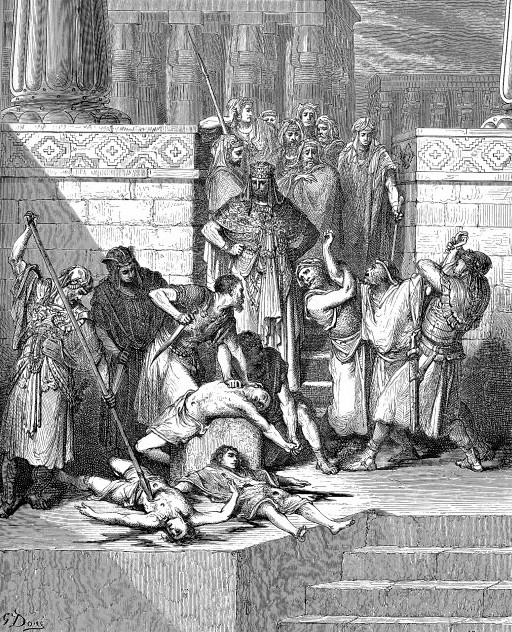
* See a drawing of Zedekiah sons killed by Dore to the right.
>What can be learned about people who hear the word of God but do not love and obey the Lord?
* 1 Timothy 4:13-16 "Until I come, devote yourself to the public reading of Scripture, to preaching and to teaching. Do not neglect your gift, which was given you through a prophetic message when the body of elders laid their hands on you. Be diligent in these matters; give yourself wholly to them, so that everyone may see your progress. Watch your life and doctrine closely. Persevere in them, because if you do, you will save both yourself and your hearers."
*
*
*
*
*
II. Nebuchadnezzar Burns Jerusalem (52:12-30)

>4. Who was sent to Jerusalem" (12)
* Jeremiah 52:12 "On the tenth day of the fifth month, in the nineteenth year of Nebuchadnezzar king of Babylon, Nebuzaradan commander of the imperial guard, who served the king of Babylon, came to Jerusalem."
* "on the tenth day" -The parallel in 2 Kings 25:8 reads "seventh day"; one of the numbers is a copiest's error or one is according to the Hebrew calendar the the other is according to the Babylonian calendar. (see 22, 25, 31 too)
* "fifth month" -Not sure if this is the Hebrew calendar or the Babylonian calendar.
* "the nineteenth year of Nebuchadnezzar king of Babylon" -Nebuchadnezzar was crowned king of Babylon when his father died in 609 B.C. Therefore this would be 590 B.C.
* "Nebuzaradan commander of the imperial guard" -The highest position in Nebuchadnezzar's army.
>What did he do? (13-14)
* Jeremiah 52:13-14 "He set fire to the temple of the LORD, the royal palace and all the houses of Jerusalem. Every important building he burned down. The whole Babylonian army under the commander of the imperial guard broke down all the walls around Jerusalem."
*
*
*
*
* 39:8-9 and 2 Kings 25:8-12 are parallel passages.
>Who were the only people left in the land? (15-16)
* Jeremiah 52:15-16 "Nebuzaradan the commander of the guard carried into exile some of the poorest people and those who remained in the city, along with the rest of the craftsmen and those who had gone over to the king of Babylon. But Nebuzaradan left behind the rest of the poorest people of the land to work the vineyards and fields."
*
*
*
*
*
>5. What did the Babylonians take away? (17-19)
* Jeremiah 52:17-19 "The Babylonians broke up the bronze pillars, the movable stands and the bronze Sea that were at the temple of the LORD and they carried all the bronze to Babylon. They also took away the pots, shovels, wick trimmers, sprinkling bowls, dishes and all the bronze articles used in the temple service. The commander of the imperial guard took away the basins, censers, sprinkling bowls, pots, lampstands, dishes and bowls used for drink offerings--all that were made of pure gold or silver."
*
*
*
*
>What does their weight say about how God had blessed Israel in David and Solomon's days? (20-23)
* Jeremiah 52:20-23 "The bronze from the two pillars, the Sea and the twelve bronze bulls under it, and the movable stands, which King Solomon had made for the temple of the LORD, was more than could be weighed. Each of the pillars was eighteen cubits high and twelve cubits in circumference; each was four fingers thick, and hollow. The bronze capital on top of the one pillar was five cubits high and was decorated with a network and pomegranates of bronze all around. The other pillar, with its pomegranates, was similar. There were ninety-six pomegranates on the sides; the total number of pomegranates above the surrounding network was a hundred."
*
*
*
*
*
>What can we learn about the Lord's actions at this time about blessings?
*
*
*
*
*
>6. Who else was taken into captivity at this time? (24-27)
* Jeremiah 52:24-27 "The commander of the guard took as prisoners Seraiah the chief priest, Zephaniah the priest next in rank and the three doorkeepers. Of those still in the city, he took the officer in charge of the fighting men, and seven royal advisers. He also took the secretary who was chief officer in charge of conscripting the people of the land and sixty of his men who were found in the city. Nebuzaradan the commander took them all and brought them to the king of Babylon at Riblah. There at Riblah, in the land of Hamath, the king had them executed. So Judah went into captivity, away from her land."
*
*
*
*
>How many were carried into exile?
* Jeremiah 52:28-30 "This is the number of the people Nebuchadnezzar carried into exile: in the seventh year, 3,023 Jews; in Nebuchadnezzar's eighteenth year, 832 people from Jerusalem; in his twenty-third year, 745 Jews taken into exile by Nebuzaradan the commander of the imperial guard. There were 4,600 people in all."
*
*
*
*
*
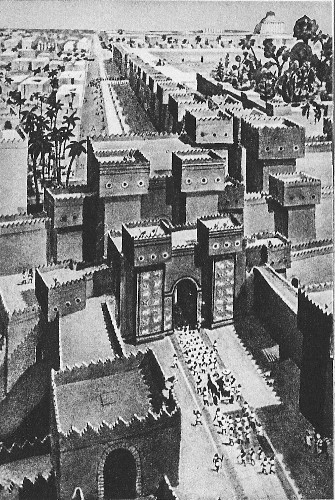
* See a drawing of Babylon to the right. Reconstruction of the prospect of ancient Babylon in the time of Nebuchadnezzar, based on excavations. A solemn procession is seen making its way through the great gateway dedicated to the goddess Ishtar. As far as the eye can travel, the broad processional way bisects the vast metropolis. In the distance (right) rises the massive ziggurat, the "Tower of Babel" (Genesis 11:3-4), while more in the foreground lie the famous "Hanging Gardens" with their luxuriant palm-trees. Nearby stood the royal palace, in which later on, presumably after he had been pardoned, King Jehoiachin with his sons and personal attendants also lived. (Jeremiah 52:31-33) (The Bible as History in Pictures, Werner Keller)
>Did rank and position exempt anyone from exile?
*
*
*
*
*
III. Jehoiachin Released (52:31-34)

>7. Who is Jehoiachin?
* Jeremiah 52:31-32 "In the thirty-seventh year of the exile of Jehoiachin king of Judah, in the year Evil-Merodach became king of Babylon, he released Jehoiachin king of Judah and freed him from prison on the twenty-fifth day of the twelfth month. He spoke kindly to him and gave him a seat of honor higher than those of the other kings who were with him in Babylon."
* "Jehoiachin king of Judah" -Jehoiachin (597 B.C.) was taken to Babylon in the first Exile in 597 B.C. by Nebuchadnezzar after only three months as king of Judah. (2 Kings 24:10-17; 2 Chronicles 36:9-10) He was put into chains. Years later Nebuchadnezzar released him from prision and allowed him to eat at his table. (2 Kings 25:27-30)
* 2 Kings 24:8-17 "Jehoiachin was eighteen years old when he became king, and he reigned in Jerusalem three months. His mother's name was Nehushta daughter of Elnathan; she was from Jerusalem. He did evil in the eyes of the LORD, just as his father had done. At that time the officers of Nebuchadnezzar king of Babylon advanced on Jerusalem and laid siege to it, and Nebuchadnezzar himself came up to the city while his officers were besieging it. Jehoiachin king of Judah, his mother, his attendants, his nobles and his officials all surrendered to him. In the eighth year of the reign of the king of Babylon, he took Jehoiachin prisoner. As the LORD had declared, Nebuchadnezzar removed all the treasures from the temple of the LORD and from the royal palace, and took away all the gold articles that Solomon king of Israel had made for the temple of the LORD. He carried into exile all Jerusalem: all the officers and fighting men, and all the craftsmen and artisans--a total of ten thousand. Only the poorest people of the land were left. Nebuchadnezzar took Jehoiachin captive to Babylon. He also took from Jerusalem to Babylon the king's mother, his wives, his officials and the leading men of the land. The king of Babylon also deported to Babylon the entire force of seven thousand fighting men, strong and fit for war, and a thousand craftsmen and artisans. He made Mattaniah, Jehoiachin's uncle, king in his place and changed his name to Zedekiah."
* 2 Kings 25:27-30 "In the thirty-seventh year of the exile of Jehoiachin king of Judah, in the year Evil-Merodach became king of Babylon, he released Jehoiachin from prison on the twenty-seventh day of the twelfth month. He spoke kindly to him and gave him a seat of honor higher than those of the other kings who were with him in Babylon. So Jehoiachin put aside his prison clothes and for the rest of his life ate regularly at the king's table. Day by day the king gave Jehoiachin a regular allowance as long as he lived."
* 2 Chronicles 36:9-10 "Jehoiachin was eighteen years old when he became king, and he reigned in Jerusalem three months and ten days. He did evil in the eyes of the LORD. In the spring, King Nebuchadnezzar sent for him and brought him to Babylon, together with articles of value from the temple of the LORD, and he made Jehoiachin's uncle, Zedekiah, king over Judah and Jerusalem."
* "Evil-Merodach became king of Babylon" -Evil-Merodach (562-560) was the son of Nebuchadrezzar. He is also known as Amel-Marduk, Awil-Marduk, and Amil-Marduk. His name means 'man of Marduk'. He died 560 B.C. and the new king of Babylon became Neriglissar, son-in-law of Nebuchadrezzar. Daniel must have served in these king's court though his book does not say so.
* The year is 562 in this Chronological look at Israel and Judah's history. This took place while Nebuchadnezzar's son, Amel-Marduk (aka Awel-Marduk, Evil-Merodach) reigned 2 years.
Jehoiachin had been Judah's king 3 months during Nebuchadnezzar's Jerusalem siege. Jehoiachin had done evil in his life. The Bible does not say why Jehoiachin, his mother and attendants surrendered. It only said Jehoiachin surrendered. Perhaps he repented and obeyed the Lord's word through the prophet Jeremiah who was telling the people that they should surrendered. Perhaps he saw it was hopeless to hold out.
37 years later Awel-Marduck became ruler and released Jehoiachin. Jehoiachin's prison had not been bad, yet it was not good either. Now his life suddenly changed dramatically again. This time not of his doing.
My life had changed dramatically rather quickly several times in my life to. God is in total control. He may allow me to suffer the consequences of my sins or the sins of others. He may suddenly intervene and perform a miracle or a chain of miracles. Either way I cannot be sure that the end of the day will be the same as the beginning of the day. Next week my life may be different. I should not be surrendered nor without hope.
Jesus taught again and again that we should be prepared for his coming which will bring drastic change to my life and the course of world history. The one thing he wants me to know is I must be prepared. I need to be prepared and hope that what is now is not the way it may be tomorrow. One the same thought, if life is going well then I should not be surprised is something bad happens either. I should not let the good life think it is good because I am good and then be surprised when something bad happens.
The one thing that outside events should not change is my heart towards Jesus. The one thing that cannot change is his love for me. A firm foundation set in Christ will keep me anchored in any storm per Jesus's parable.
>What happened to him while in captivity?
* Jeremiah 22:28 "Is this man Jehoiachin a despised, broken pot, an object no one wants? Why will he and his children be hurled out, cast into a land they do not know?"
*
*
*
*
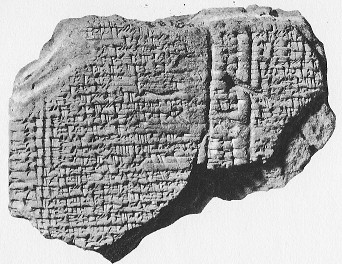
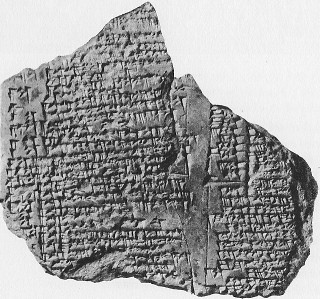
* Two Babylon clay tablets. These two fragments of clay tablets which were found in Babylon, and which contain lists of rations delivered to captives there. The cuneiform text reads as follows: “10 (sila of oil) for ... Jaukin (Jehoiachin), king of Judah, 2-1/2 sila for... the sons of the king of Judah, 4 sila for eight men from Judah" ... “1-1/2 sila (of oil) for three carpenters from Arvad, 1/2 sila each. 11-1/2 for eight ditto from Babylon, 1/2 sila each, 3-1/2 sila for seven ditto, Greeks, 1/2 sila each ... 10 (sila) for Jakukinu (Jehoiachin), son of the king of Judah, 2-1/2 sila for the five sons of the king of Judah by the hand of Qanama..." The clay tablets which date from 592 B.C. prove that the king of Judah must have lived in Babylon with his sons and some retainers, since they are still on the ration strength six years after the fall of Jerusalem and the deportation. They demonstrate the historical accuracy of the biblical text. (The Bible as History in Pictures, Werner Keller)
>How was his exile lightened? (33-34)
* Jeremiah 52:33-34 "So Jehoiachin put aside his prison clothes and for the rest of his life ate regularly at the king's table. Day by day the king of Babylon gave Jehoiachin a regular allowance as long as he lived, till the day of his death."
*
*
*
*
*

|























